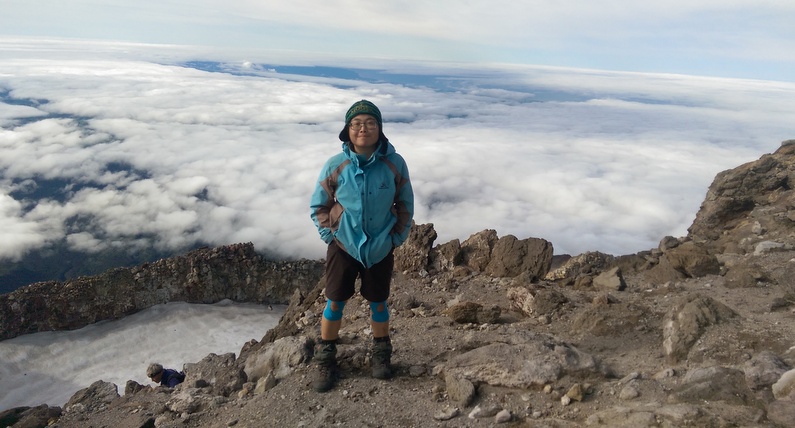
10 questions with … Phoebe Fang
A mishap in the mountains led to Phoebe Fang volunteering for LandSAR, which in turn led to paid employment in emergency management and public health.
How did you first learn about LandSAR?
I had been tramping for a while when I attended a Bushcraft course run by the Taranaki Alpine Club. Both instructors were LandSAR volunteers, and whilst we learned about being lost or injured, they discussed lost person behaviour and how SAR works. It sounded really interesting, and planted the seed for me to join up.
Can you tell us about your first-hand experience of being rescued?
It was St Patrick’s Day 2018. I was shortly to move to Wellington and hadn’t yet climbed the western side of Taranaki Mounga. Everyone else was in town partying, but I was determined to go, and went alone. After a successful ascent, I was hurrying down and tripped. I was struck on the head by falling rocks, and with blood all over the place, it was lucky I could call 111. I was grateful for the bushcraft course which taught me to keep warm in a pack liner until the helicopter arrived. Afterwards, I went and bought a beacon as soon as I could.
How did that lead to volunteering for SAR?
After moving to Wellington, it made sense to give something back, because I had the interest and the time to commit to the role.
Can you tell me about a memorable SAR job??
In Eastbourne Regional Park, there’s so many trap lines and unofficial tracks that people often get lost there. It was a still night, and conditions were textbook for doing a sound and light line search. The missing party walked out by themselves, but it was really satisfying applying the techniques we’d learnt on courses to real-world searches.
How did your involvement progress to Incident Management Team (IMT) roles?
I wanted to know more about the bigger picture and how a SAR opera-tion is managed, so I went along to IMT training to learn. I also wanted to understand more about the psychology of lost person behavior, which had started my interest back in Taranaki. Then in late 2021 I broke my ankle, so it made sense to transition to IMT to keep contributing. I guess I would have moved to IMT eventually; the ankle just sped up the process a little! I particularly enjoy the Geographic Information Systems work and writing taskings in a fast paced environment.
What is your professional background?
I was a kindy teacher, but it wasn’t really a job you could do remotely during the pandemic. So with my free time in lockdown, I was able to volunteer at the Wellington Regional Emergency Management Office (WREMO). The work was structured with the Coordinated Incident Management System (CIMS), just like a SAR IMT, so I could learn the specifics of the new role pretty quickly.
How did that lead on to paid employment?
I decided to go back to university to study Geology and Data Science, and when looking for summer work, saw that my SAR and WREMO colleagues had shared a job opportunity in COVID-19 response man-agement at the Hutt Valley District Health Board. The good references and relevant experience allowed me to get the job.
What is the best part about being involved in SAR?
It's the people! The Wellington group is a really diverse, super talented and proactive team. There’s a fantastic community spirit, and everyone looks out for one another.
What challenges have you faced during your volunteering? The people are so awesome that I have a bit of ‘imposter syndrome’ like I’m not worthy of being in the team. But the group is so supportive, and I know that so much of their time and effort has been involved in training me, so there’s no reason to think “I’m not good enough, so I won’t go out.”
What is your advice to other people who’d like to be involved in SAR.
They let me in so you’ll be fine! [Laughs]. Give it a go, and take every chance to learn more. Be patient; training and experience comes with time and if you have the commitment to the role you’ll get back what you put in.
This article was first published in the December 2022 issue of Link Magazine.
